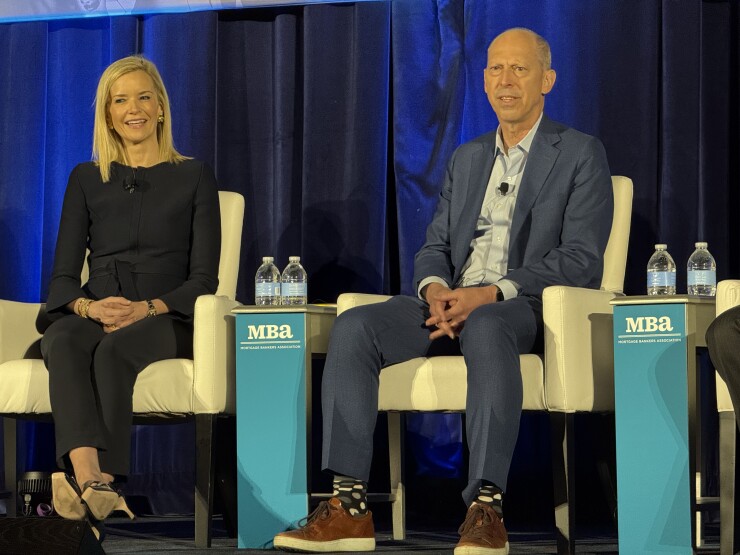While some policymakers have long pushed to release Fannie Mae and Freddie Mac from government conservatorship, experts caution that a return to full privatization would be far from a fairy tale.
Panelists Tuesday at the Mortgage Bankers Association's Secondary & Capital Markets Conference weighed the many downsides of the complicated, and increasingly unlikely move if it ever occurred. They emphasized the common refrain from stakeholders that the process could be
"We would question the fascination, the sort of obsession with releasing the GSEs in the first place because we don't understand what objectives it would actually achieve from a policymaker perspective," said Libby Cantrill, managing director and head of public policy at PIMCO.
Analysts weighed in on the government-sponsored enterprises on the same stage where Federal Housing Finance Agency Director Bill Pulte less than 24 hours earlier said the consequential decision would be made by
Cantrill mulled policy objectives for a release, noting the mortgage market today is fairly liquid. Borrowers with wide varieties of credit profiles can access the same mortgage rate. Shrinking the GSE's footprint is better achieved under conservatorship, she said, referencing former FHFA director Mark Calabria's calls for the GSEs to
"In terms of socializing losses and privatizing gains, we would say that's a bad deal for taxpayers," said Cantrill.
How Fannie Mae and Freddie Mac's credit ratings would be affected
As Moody's
"We think there could be some scenarios where the government does not bail out Fannie and Freddie," said Kornfeld. "We think that the level of downgrade would be somewhat modest, maybe 1-3 notches, from Aa1 to as low as A1."
A lack of an explicit guarantee for the GSEs by the government would disrupt financing and required yields for mortgage-backed securities substantially, said Scott Ulm, CEO and vice chairman of Armour Residential REIT.
"Our capital structure has depended on the kindness of others in the repo market, in the market for mortgage-backed securities, so, it's really not something that we can decide," he said.
PIMCO's clients, such as sovereign wealth funds and public pension plans, view MBS and Treasuries as interchangeable, Cantrill said. Introducing credit risk would alter their views on their portfolios.
Cantrill suggested lawmakers "don't fix what's not broken," in favor of shrinking the GSE's footprint in-house. She offered an additional argument for hanging onto Fannie Mae and Freddie Mac.
"A really important function of the GSEs is a countercyclical one," said Cantrill. "ThInk about what they did during COVID, during any recessionary period of time. They are providing that type of support when actually borrowers need it the most."





